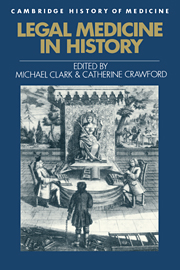Book contents
- Frontmatter
- Contents
- Notes on contributors
- Preface
- Introduction
- I Early modern practice
- II The growth of a science
- 4 Legalizing medicine: early modern legal systems and the growth of medico-legal knowledge
- 5 Infanticide trials and forensic medicine: Württemberg, 1757–93
- 6 Training medical policemen: forensic medicine and public health in nineteenth-century Scotland
- III Special offenders
- IV The politics of post-mortems
- V Medical authority in question
- Index
- Cambridge History of Medicine
4 - Legalizing medicine: early modern legal systems and the growth of medico-legal knowledge
from II - The growth of a science
Published online by Cambridge University Press: 08 January 2010
- Frontmatter
- Contents
- Notes on contributors
- Preface
- Introduction
- I Early modern practice
- II The growth of a science
- 4 Legalizing medicine: early modern legal systems and the growth of medico-legal knowledge
- 5 Infanticide trials and forensic medicine: Württemberg, 1757–93
- 6 Training medical policemen: forensic medicine and public health in nineteenth-century Scotland
- III Special offenders
- IV The politics of post-mortems
- V Medical authority in question
- Index
- Cambridge History of Medicine
Summary
It has long been remarked that Britain lagged nearly two centuries behind continental Europe in developing a science of forensic medicine. In his ‘Early history of legal medicine’ (1950–1), Erwin Ackerknecht cited more than a dozen monographs on medico-legal problems published in France and Italy during the late sixteenth and early seventeenth centuries. Thereafter, German publications began to multiply, and ‘there was in Germany during the 18th century an almost uninterrupted production of treatises on legal medicine’. By contrast, wrote Ackerknecht, the English contribution to the science of forensic medicine before 1800 was ‘practically nil’. Subsequent research has identified a few more English writings on the subject, but the paucity of English medico-legal literature in the early modern period in comparison with that of the Continent remains striking.
England did not lack medico-legal activity. Between 1730 and 1760, medical testimony was heard at more than half the homicide trials at the Old Bailey, the main criminal court for London and Middlesex. It was also not uncommon in America and northern England in the seventeenth and eighteenth centuries, as the first three chapters of this book show. The medical questions that arose in legal proceedings were rather different from those encountered in private practice, yet English medical and legal literature provided practitioners and magistrates with very little guidance on the subject. This chapter attempts to account for both the rarity of medico-legal studies in early modern England and the relative abundance of such publications in Italy, France and especially Germany.
- Type
- Chapter
- Information
- Legal Medicine in History , pp. 89 - 116Publisher: Cambridge University PressPrint publication year: 1994
- 24
- Cited by

